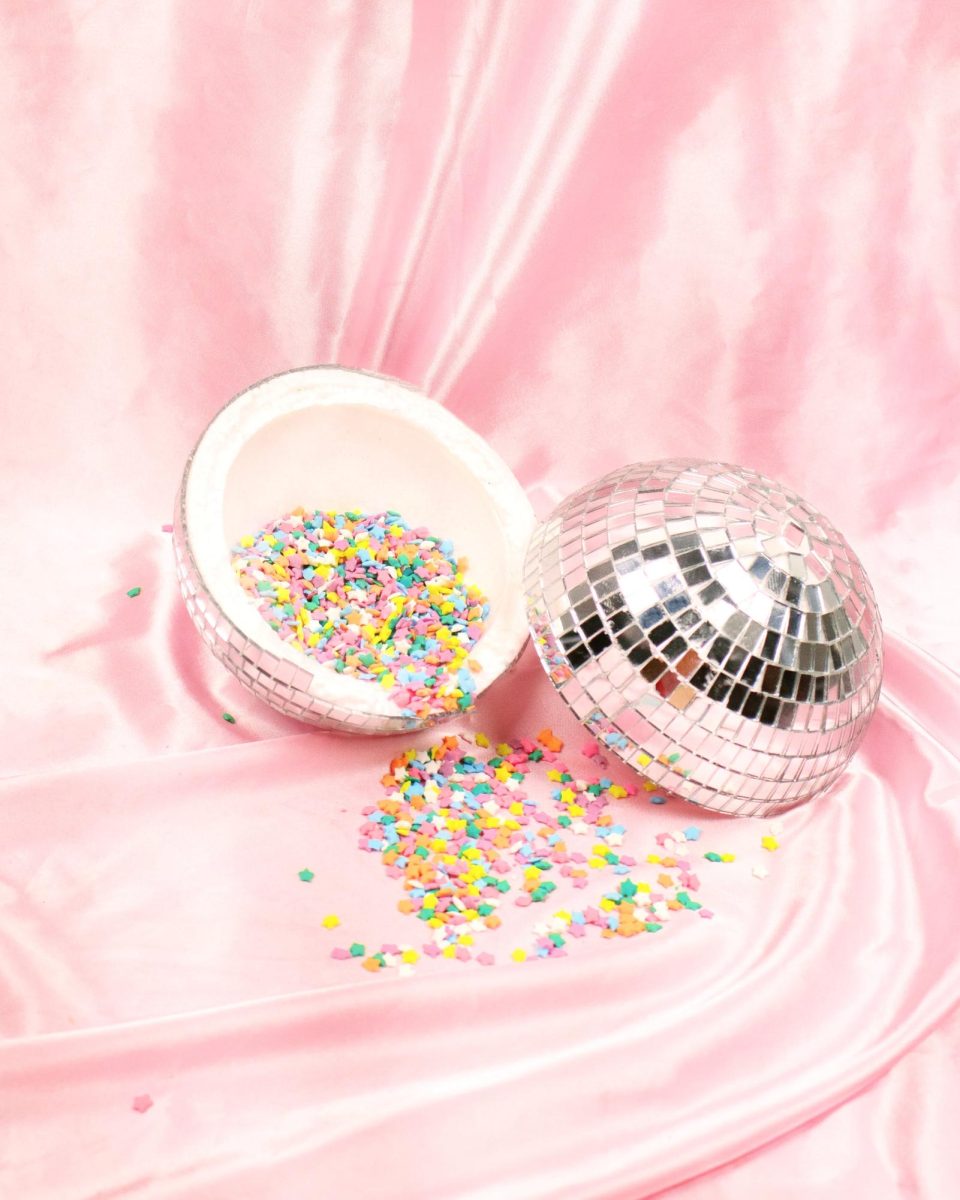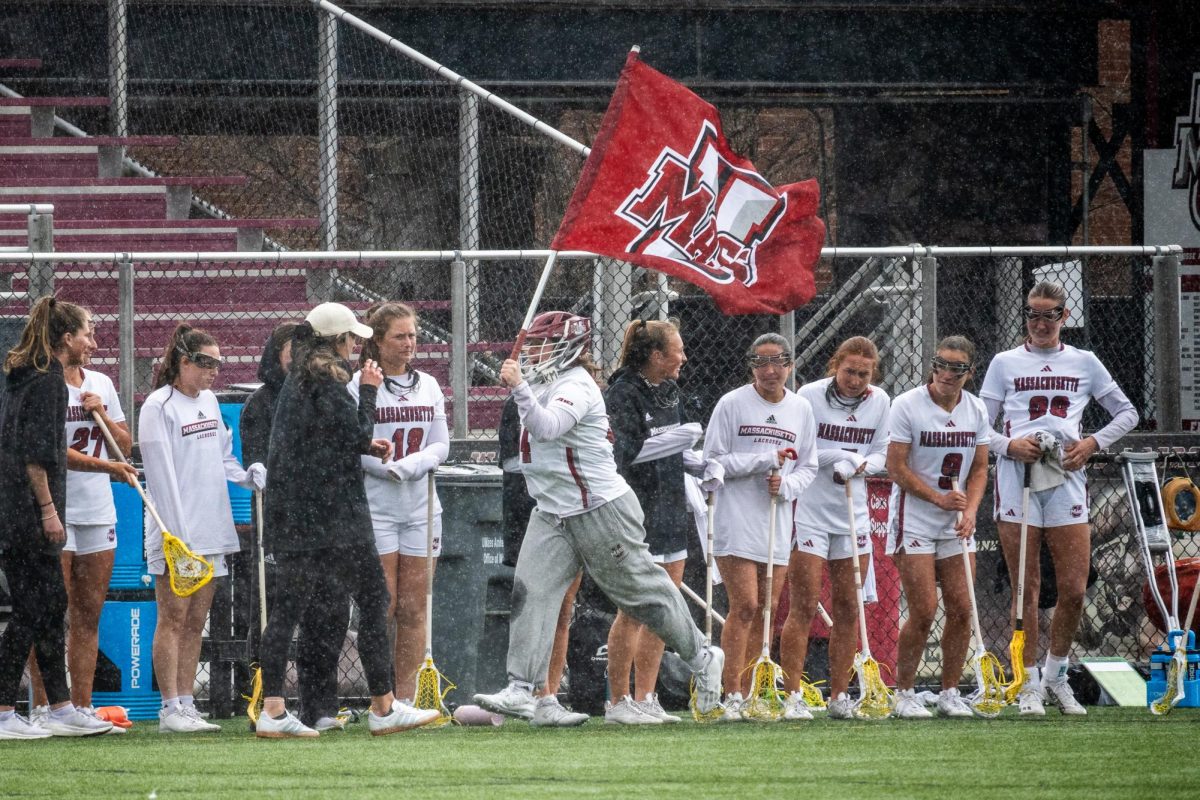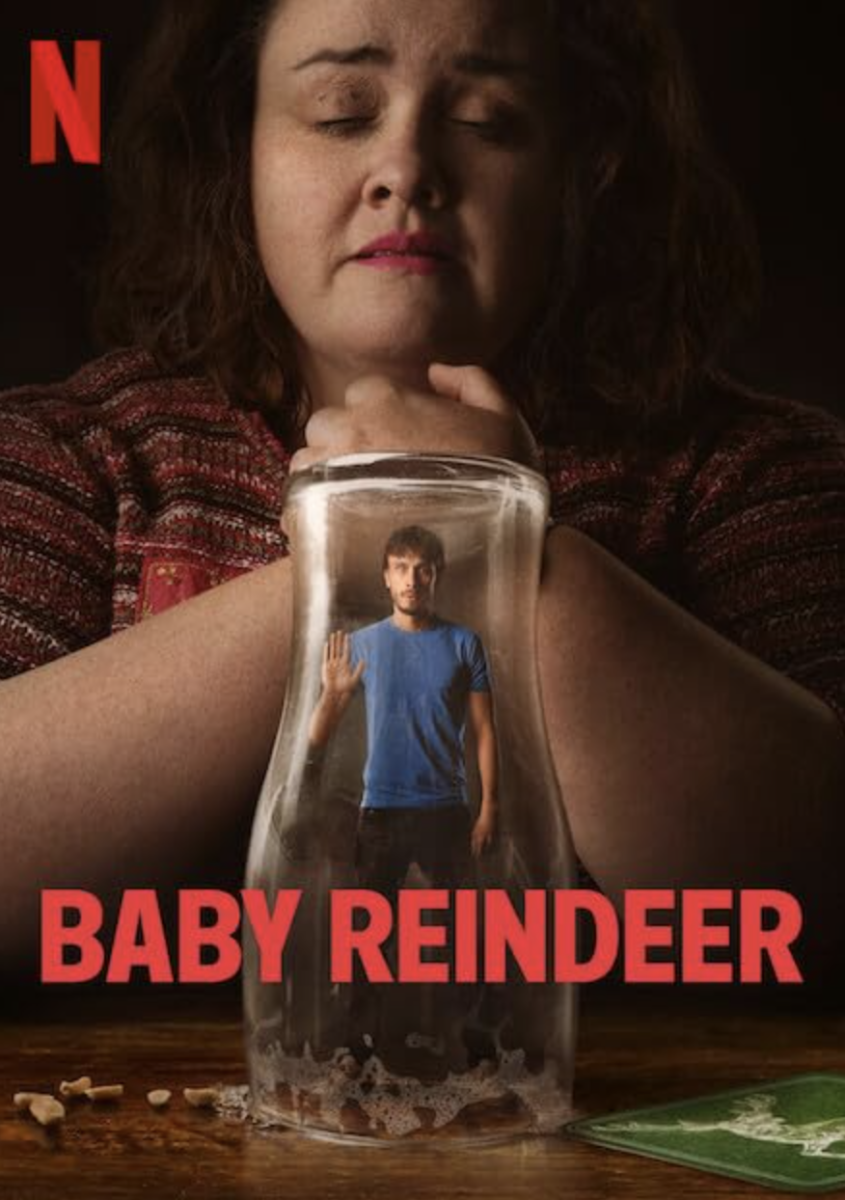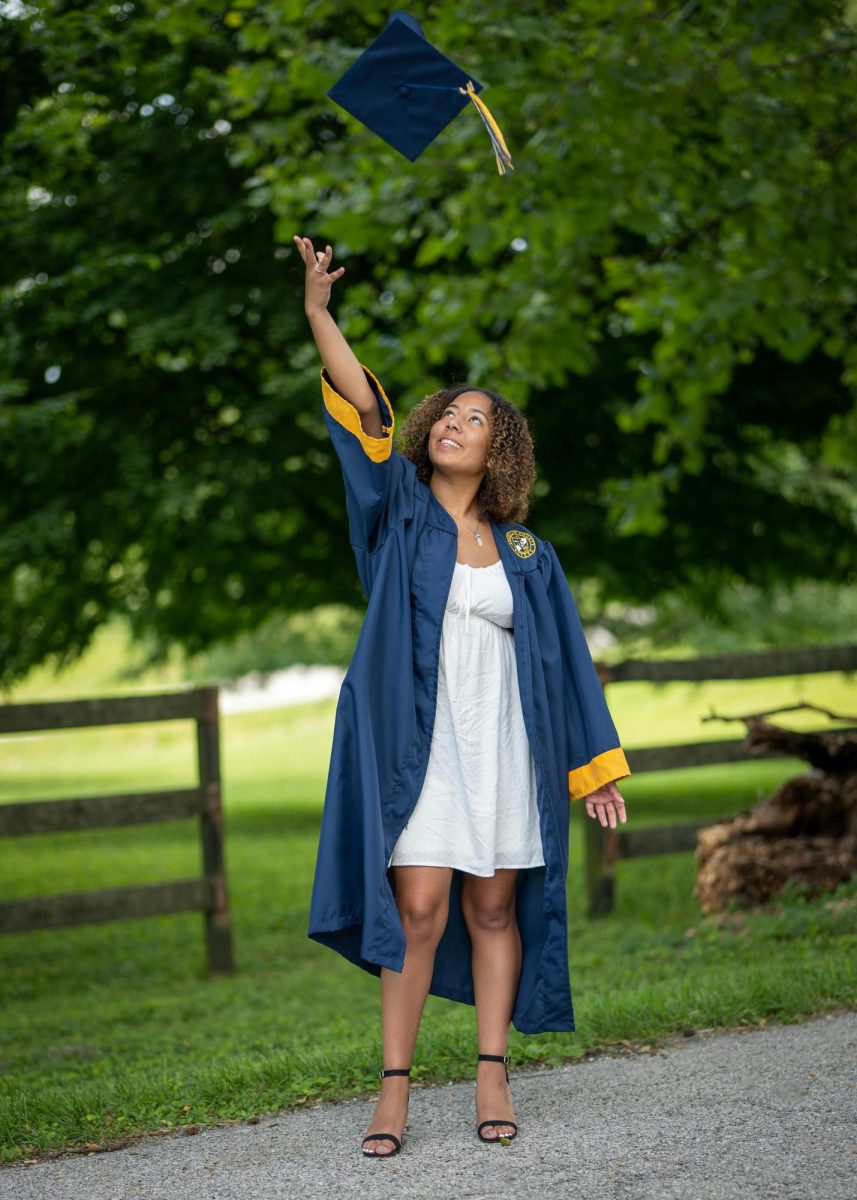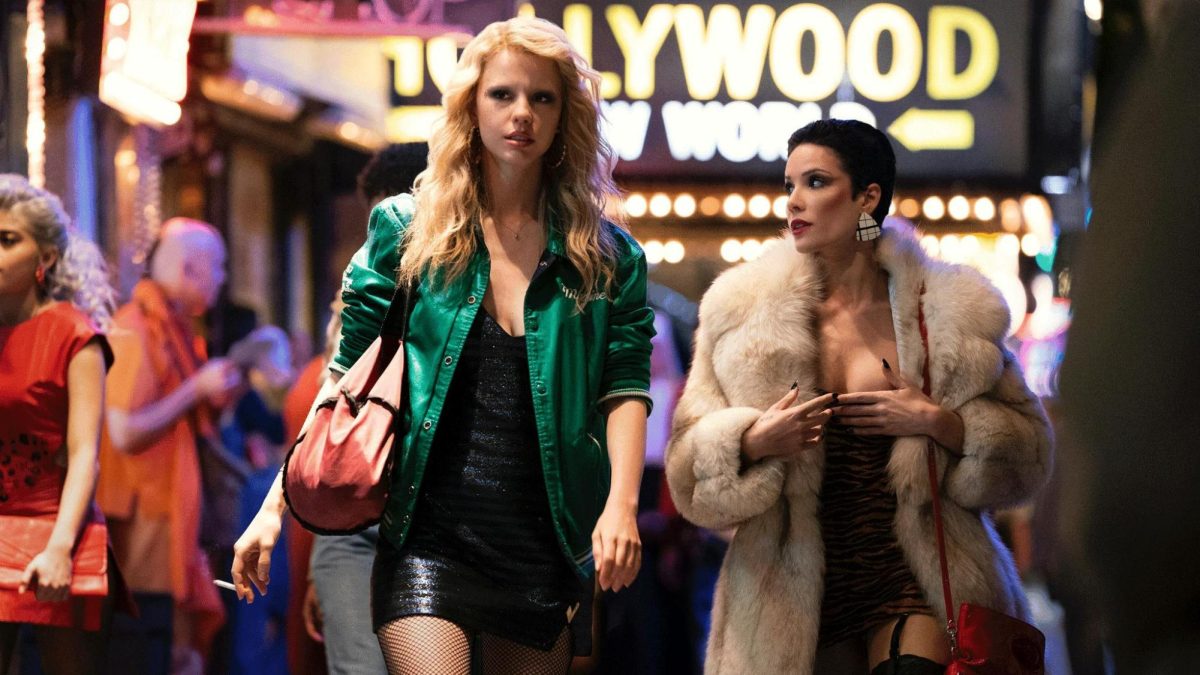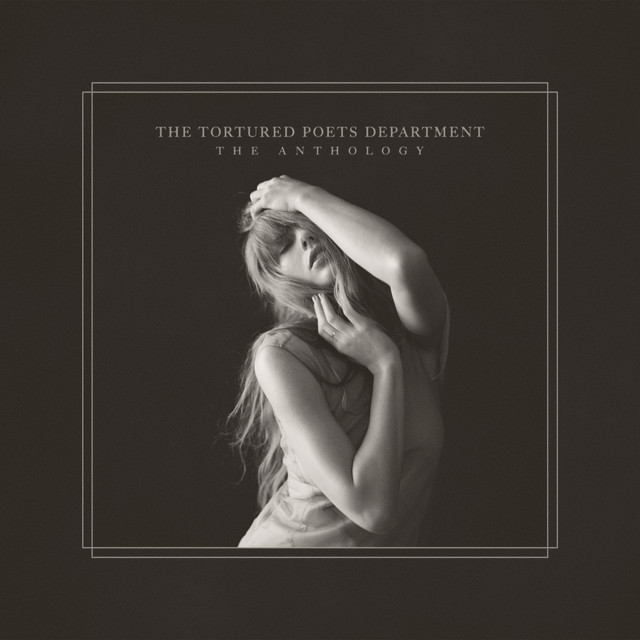While reflecting on 2023, we can safely say we learned Barbie is that b***h, Taylor Swift controls NFL ratings (and the U.S. economy) and pink is the new black. In the wake of #MeToo and the COVID-19 pandemic, young women are reclaiming the fads of their youth at full-force, ditching the darkness of womanhood for the lighthearted, femme-tastic girlhood community.
2023 marked 40 years since the release of “Girls Just Want To Have Fun,” the song that skyrocketed Cyndi Lauper’s music career. Whether it’s blasting on the dancefloors at proms or weddings, through the backseat speakers of Honda Odysseys or the stale airwaves of grocery store radios, the glitzy synth-pop hit has cemented itself as a timeless anthem for girls seven to 70. These “girls” include Lauper herself, who was 30 years old and well into womanhood at the time of the song’s release.
“I remember one time, the Happy Meal toy was a little mini-CD of Kidz Bop songs,” Kate Dahlman, senior English major at the University of Massachusetts, said. “I remember that the CD I got was ‘Girls Just Want To Have Fun,’ and having so much fun listening to that in the car, and feeling like I just won a big prize.”
This past summer was loosely referred to in the TikTok-sphere as “the girl summer,” largely because of two record-breaking, girly mega-franchises. “Barbie,” the highly anticipated feminist blockbuster, was the highest-grossing film of 2023. In March, Taylor Swift embarked on her Eras Tour, a 44-song tribute to her career. Swift was not only the most-streamed Spotify artist of 2023, but she was also named Time Magazine’s Person of the Year for 2023.
Chloe Koontz, a 21-year-old senior at Florida State University, is one of countless young women who celebrated “girl summer.” In September, she penned the article “Why Summer 2023 Was for the Girls” for her school’s Her Campus page. Koontz cited “Barbie” and Swift’s tour as just some of the pop culture staples of this “summer for the girls.” She discussed shamelessly enjoying things that may be viewed as overly feminine or immature, such as liking pink and wearing hair ribbons.
This is “girlhood” redefined — a community of women embracing youthful femininity, defying the long-standing dismissal of “girlish” expressions and interests. The enticing allure of Barbie pink, besties holding hands and wearing friendship bracelets (a Swift concert staple) has made this space irresistibly welcoming for many young women.
Womanhood, on the other hand, is often associated with heavier experiences. A monologue from Kristin Scott Thomas’ character from the dark British-comedy series “Fleabag” says it best: “Women are born with pain built in. It’s our physical destiny: period pain, sore boobs, childbirth, you know.” Combining these factors with the shared trauma from years of abuse from individual men and the patriarchy overall, it’s no wonder that in 2023, girls just wanted to be girls.
The distinction between “girl” and “woman” is murky, especially for women in their twenties. The tumult and uncertainty associated with the early twenties — as Swift puts it in her hit “22,” “happy, free, confused and lonely at the same time” — is being dragged out even further. Women are not only connecting more with younger fads but hitting major milestones later in life.
According to data from Pew Research, the age of the average first-time bride in the U.S. rose from 21 in 1969 to 28 in 2020. Many of these young people are also staying in their childhood homes longer; nearly half of Americans aged 18 to 29 live with their parents, according to Bloomberg. Most adults surveyed cited financial reasons as to why they still lived at home, which was largely influenced by student loans and the job insecurity many faced because of the COVID-19 pandemic.
Koontz and many others have experienced a sensation referred to as the “pandemic skip” where they still identify as the age they were at the beginning of the COVID-19 pandemic.
“There have been times when people have asked me how old I am and for just a split second, I’m thinking I’m 18,” Koontz said. “You know, like, imposter syndrome? Like how people in super fancy jobs think that they don’t belong there, or something? I feel that way sometimes with womanhood. I still feel like I’m just a girl, I’m just a kid.”
“I always joke that I’m 24 and I feel like I’m still in college,” Elisa Kennedy, a Medford resident, said. “I definitely feel like I lost a couple of my prime years. I turned 21 during COVID, so I still feel like I’m kind of like a 20-year-old.”
Kennedy, Koontz and many other young women playfully refer to themselves as a “teenage girl in her twenties,” a recent social media phenomenon. “I feel like it’s a very supportive space for allowing yourself to explore those interests that get brushed off as sort of being younger and being girlish,” Koontz explained.
“I definitely relate to it,” Kennedy said. She cited COVID-19 and the resulting influx of social media use as being responsible for the creation of this community. “I’ve always been really into celebrities and pop culture,” Kennedy continued. She mentioned Taylor Swift and the Hunger Games as recent obsessions, ones she shares with her early-teenage self.
“It’s a cool way to meet people through that … It makes me feel connected to people, and young,” she said. “But, also like, I am 24, but it makes me feel like I don’t have to grow up super fast.”
____________________________________________________________________________________________________
In 2019, rapper Megan Thee Stallion released her song “Hot Girl Summer,” popularizing the phrase and phenomenon. “Being a Hot Girl is about being unapologetically YOU, having fun, being confident, living YOUR truth, being the life of the party etc.,” the artist tweeted a month before the song’s release.
Thus followed a tidal wave of “girl” trends: the “hot girl walk” that dominated the early lockdown era, where girls laced up their Nikes to strut through their neighborhoods. There was the “live, laugh, love” parody catchphrase “gaslight, gatekeep, girlboss” that spawned from Tumblr in early 2021, poking fun at the commodified and cringy “girlboss” feminism of the 2010s.
2023 brought in the hyper-saturation of “girl” TikTok trends, most obviously the aforementioned “teenage girl in her twenties” and the unifying buzzword “girlhood.” There’s been the phrase “I’m literally just a girl,” a play on No Doubt’s 1995 hit “Just a Girl,” and a relatable reaction to not wanting to schedule a doctor’s appointment. More recently we saw “girl math,” an unserious way of justifying an eight dollar latte, or that by shopping in the clearance section, you’re earning money rather than spending it.
This summer, TikTok served us “girl dinner,” a trend showcasing the odd feminine urge to eat a mishmash of little snacks in lieu of a normal meal. “It’s stuff that you don’t really realize is normal until you see like all the other girls around you doing it,” Koontz said. “It’s okay if I want to just eat a plate of mac and cheese and four Takis!”
But the popularization of “girls” in mainstream media has been around since long before the late 2010s. In 1992, Kathleen Hanna formed the all-female punk band Bikini Kill, a primary influence in the larger underground “Riot Grrrl” punk-feminist movement.
“The Riot Grrrls invented the modern usage of girl-power,” Robin Wasserman wrote in her 2016 essay, “What Does It Mean When We Call Women Girls?” “The word has become a weapon with which to fight back.”
Smithsonian’s National Museum of American History unveiled its exhibit, “Girlhood (It’s Complicated)” in October 2020. The exhibit tackled the experience of the under-21 crowd, drawing from Riot Grrrl influences.
“The whole design of the show was based on zines,” Dr. Kathleen Franz, project director and lead curator of the exhibit, explained. “[Zines were] very important for reclaiming ‘girl,’ and sort of the radicalizing of the idea of ‘girl’ and ‘girlhood’ … to be a kind of liminal space where you could really define yourself before you have to go to work, or before you have to get married.”
Franz explained that the desire to remain “girly” is relatively new. “Women really tried to recapture or extend youth because youth culture, by the 1920s, was a full-blown entity,” she said. This phenomenon only grew stronger with the introduction of the teenager as an age demographic following World War II.
Wasserman’s essay explores the usage of “girl” in book and television show titles, à la “Gone Girl,” “The Girl on the Train,” “New Girl” and of course, — arguably the archetype of the “teenage girl in her twenties” — HBO’s 2010s sitcom, “Girls.” Wasserman found that “girls” are those who are still becoming women, as well as those who have not yet given up their personal power to the role of wife or mother. “Girl attunes us to what might be gained and lost in the transformation,” she explained.
In her article, Wasserman includes a quote from comedian Louis C.K., who has since had multiple sexual harassment allegations against him. “[You] might say, ‘I’m 22, I’m totally a woman,’” the comedian said. “Not to me, sorry. To me you’re not a woman until you’ve had a couple of kids and your life is in the toilet … When you become a woman is when people come out of your vagina and step on your dreams.”
Wasserman’s article was published in 2016, one year before the allegations against Louis C.K. became public and the #MeToo movement gained mainstream recognition. #MeToo, “a global and survivor-led movement against sexual violence,” opened dialogue and created a supportive sub-community within womanhood.
To classify it as a sub-community, however, is an extreme understatement — 97% of women aged 18-24 reported being sexually harassed in public spaces, according to a 2021 report.
Kennedy views womanhood as a community rooted in this collective battle against injustice and oppression. “It’s respecting other women and having that shared bond of just not being equal in the workplace or in life,” Kennedy said. “But, knowing that women are strong, women will hopefully stick together.”
____________________________________________________________________________________________________
The morning of May 20, Kennedy put on “the classic Eras outfit” — a black sparkly dress, red cowboy boots, pink sunglasses and disco ball earrings (an homage to Swift’s song “mirrorball”). She and three college friends piled into her Subaru to make the drive to Gillette Stadium for the second of the three Eras shows that weekend. Listening to Swift’s discography on shuffle, the girls filmed a TikTok predicting the surprise songs the pop star would perform for that night’s concert.
The May 20 show has since been lovingly dubbed “the rain show” because of an unrelenting downpour that lasted through the entire concert. But this didn’t stop fans from making the most of their experience. Kennedy traded homemade bracelets with fellow fans and security guards, and ran into old friends who happened to be seated in her section.
If anything, the rain elevated the concert experience. “It was really special,” Kennedy said. “The rain obviously made it different, but it was cool to see some songs in the rain, and just how iconic she was in the rain.”
Kennedy was one of two million attendees of the Eras Tour this summer. Swift’s sixth tour, a celebration of her 10 albums and their corresponding “eras,” grossed $1.04 billion, and now holds the Guinness World Record for the highest grossing tour of all time. Swift has even been credited for boosting the national economy — she was cited in a report from the Federal Reserve this July, and praised for an economic boost by the state and local governments of many of her tour stops.
“It was my favorite experience ever,” Koontz said, who attended the second Eras Tour performance in Tampa with her best friend. “Hearing all the girls compliment each other and just shout at random girls across the road and being like, ‘You look so cute!’ … It was just a really healing experience. And I know that Taylor isn’t like, obviously responsible for girlhood in general, but it just felt nice to see her facilitating that.”
____________________________________________________________________________________________________
This July, millions flocked to air-conditioned movie theaters, sporting blonde wigs and pink cowboy hats. Kennedy wore her same “Eras Tour” pink sunglasses — “Those have gotten a lot of use this year,” she said — to a sold-out, opening weekend showing. Koontz “completely cried at the end.” Dahlman finally saw “Barbie” in August, after spending the summer in Italy.
“It was a really cool experience to see it over the summer at the same time as, you know, most other women around the world,” Dahlman said. Though each in different circumstances Kennedy, Koontz and Dahlman all saw “Barbie” in theaters with their moms.
“It was a really special moment to watch that with my mom,” Dahlman said. “I feel like that movie speaks a lot to the generational happiness that exists between women …
Thinking of your mom as a girl and having a girlhood … that was a very important idea that came out of watching this movie together.”
“I feel like it really focused a lot on reclaiming the parts of being a girl that we were kind of told to — maybe not told to, explicitly — but suggested that we hide,” Koontz explained. “I remember I used to not say I like the color pink because that felt too girly. I was like, I like blue and I like green. But now, I’m really reclaiming liking pink.”
The original “girlhood” TikTok trend was created shortly after the Barbie movie’s release. In one scene, Barbie (Margot Robbie) confides in the doll’s creator (Rhea Pearlman) after recently gaining sentience. “Take my hands, close your eyes; now feel,” Pearlman’s character softly encourages a tearful Barbie, cueing a montage of sun-soaked, grainy home videos set to Billie Eilish’s sorrowfully introspective piano ballad “What Was I Made For?”
The film’s emotional apex inspired a trend of imitative TikTok supercuts set to the audio from the scene. Some videos celebrate literal girlhood, including clips of their creators as young girls in childhood home movies, while others showcase beautiful moments of female friendship and femininity at any age. The videos feature the word “girlhood” emblazoned across the middle of the screen in white text.
____________________________________________________________________________________________________
As “girl summer” came to an end, it became clear that the girls are here to stay. Though “girl dinner” and “girl math” spawned in late summer, they’ve clung into Gen Z’s vernacular well into the fall.
On Sept. 8, pop artist Olivia Rodrigo released her highly anticipated sophomore album “GUTS.” The album, written and recorded during Rodrigo’s late teens and early twenties, delves into getting back with your ex, pushing away friends and the emotional precipice of early adulthood.
“GUTS” was met with positive reviews from critics (six Grammy nominations and an 8.0 rating on Pitchfork, a whole point higher than Rodrigo’s 2021 debut, “SOUR”) and an overwhelming response from internet fans.
Rodrigo’s new songs instantly resonated with Dahlman. “They’re very honest in terms of what it’s like to be a girl, and they’re very unapologetic.”
The opening track, “all-american bitch,” inspired a nuanced reimagining of Barbie’s sunny, emotionally-gooey “girlhood” TikToks. The song, a tongue-in-cheek criticism of expectations placed on young women, begins with Rodrigo’s soft, ethereal vocals and a plucky acoustic backing. The song transitions into a pop-rock chorus, with heavy backing guitars reminiscent of an early 2000s Miley Cyrus. “Got what you can’t resist / I’m a perfect all-American bitch,” Rodrigo sarcastically vocalizes in the song’s chorus.
The audio for the TikTok trend is pulled from the song’s final refrain, which abruptly cuts from Rodrigo’s piercing, angry scream to the same gentle acoustics the song opens with. She carries her sarcasm back into these forced-smile sentiments: “All the time / I’m grateful all the time / I’m sexy, and I’m kind / I’m pretty when I cry.”
With the same “girlhood” text overlaying the video, these TikToks show the emotional duality of girlhood. The videos open with a chaotic montage of female characters and music artists crying, fighting, yelling, stumbling drunk and smashing cars before a jump cut to a delicate, stereotypical depiction of femininity: girls smiling in the sun, twirling, hi-fiving their besties, embracing, holding hands and living a life where everything is peaches and cream.
While Koontz is living for the Barbie renaissance, she can relate to the darker, more raw side of girlhood. “It’s not just all the cutesy stuff,” she explained. “It’s not just people who like Barbie, and like bows and like pink. It’s being unapologetically feminine, and being feminine doesn’t have to mean, you know, liking the quintessential things that are feminine. Being feminine means scream-crying in your room and being upset by so many things because you’re just going through so many emotions as a girl.”
“Girls Just Want To Have Fun” still holds relevance today, though maybe not via a McDonald’s toy. The song’s iconic back-track was included in the star-studded “Barbie” score. “Queen of Rap” Nicki Minaj sampled “Girls” on her number one charting album “Pink Friday 2,” released Dec. 8. But are the girls still going crazy to Lauper on the dancefloor?
“Obviously,” Dahlman quickly replied. “Girls just wanna have fun!”
While 2023’s “Year of the Girl” has come to an end, Koontz believes girlhood isn’t going anywhere. “I’m hoping that it’s not just a trend,” she said. “I think people are using the trends to launch it into something, something bigger, and I hope that’s probably the case.”
Caroline Tiernan can be reached at [email protected].

